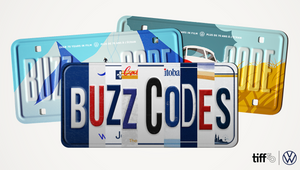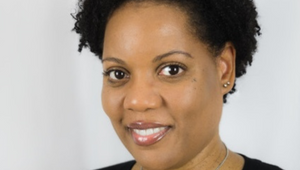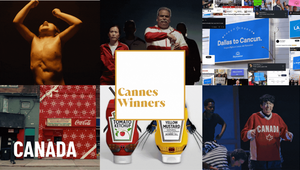
This Charity Reminded Canadians that 2SLGBTQ+ Hate Isn’t Just a Thing of the Past

While recent leadership decisions from several world superpowers have certainly done real damage to the lives of 2SLGBTQ+ people, there remains a common, optimistic assumption that generally speaking, things today are better for the queer demographic than they were in the past. After all, same-sex marriage is now legalised in 38 different countries (by comparison, in 2000, it had not yet been legalised anywhere), members of the community are more visible than they ever have been, and that exposure has taught people a lot… or so many of us would like to think.
Unfortunately, as research from charity Egale Canada and its partner creative agency VML Canada demonstrates, the fight against hate today is just as urgent as it ever has been. Even putting government foolishness aside, the fact of the matter remains, 2SLGBTQ+ people frequently encounter acts of discrimination and violence, all for simply existing. Case in point, according to Statistics Canada, police reported hate crimes targeting sexual orientation jumped 388% between 2016-2023– proof that even in ‘queer havens’ like Canada, things are less than ideal.
To this end, starting in Pride month, Egale and VML rolled out a brand new campaign titled ‘Hate Isn’t History’. Utilising a strong photojournalism aesthetic across three spots – each brought to life by a different director from Scouts Honour – the work juxtaposes incidents of 2SLGBTQ+ hate from the ‘50s, ‘70s and ‘80s against those seen in the modern day. Given how seamlessly these moments blend into each other, despite the passage of decades, it’s a stark reminder that things really haven’t changed as much as one might hope – a reminder that now more than ever, people – especially allies – need to get informed, take action, and speak out.
To learn more about how all of this came together, LBB’s Jordan Won Neufeldt sat down with VML Canada executive creative director Allen Kwong, as well as Egale Canada’s director of communications and marketing, Jennifer Boyce, for a chat.
LBB> This isn’t the first time VML and Egale have worked together. As such, what was the brief for this year’s campaign, and what immediate ideas came to mind?
Allen> When Egale briefed us on its Pride campaign, it had a clear objective: drive people to its website to get informed and act against anti-2SLGBTQ+ hate.
But, we couldn’t simply talk about the rising tide in hate, as research showed that people have become desensitised to that message – especially during a time when cultural attitudes toward the 2SLGBTQI community have shifted. We also found that recent reports of hate sounded reminiscent of stories from the distant past. That surprised us because, as a modern society, we assume that there are things that simply don’t happen anymore.
This was the spark behind the campaign. We chose incidents from the late ‘50s, ‘70s, and ‘80s, because this period marked a time when the queer community was becoming more visible and, as a result, was facing increased discrimination.
LBB> Juxtaposing discriminatory acts of past decades against a modern day setting is very poignant! What made this the right brand marketing approach for this moment in time?
Jennifer> While many people are aware of the discrimination that 2SLGBTQ+ people faced 70, 50, or even 20 years ago – discrimination during the HIV/AIDS epidemic, the blood ban, conversion therapy, and even marriage inequality (marriage equality wasn’t achieved across Canada until 2005) – they are less familiar with the discrimination facing our communities today (acknowledging that many of these issues of the past are only recently being corrected and continue to cause real harm to our communities).
Meanwhile, over the past 10 years, we have continued to see anti-2SLGBTQ+ hate rise exponentially, with police reported hate crimes targeting sexual orientation jumping 388% between 2016-2023 (Statistics Canada). And, while there is a lack of federally collected data on this, we know that the situation for trans and gender-diverse people is arguably even more severe.
Our campaign, ‘Hate Isn’t History’, was meant to achieve two goals important to this moment in time. The first: remind (or in some cases inform) people that anti-2SLGBTQ+ hate is not just a thing of the past; it’s as real today as it was 50 years ago. The second: to instil a sense of hope and allyship. We have overcome so much, and by supporting each other and working together, we can make it through this as well.
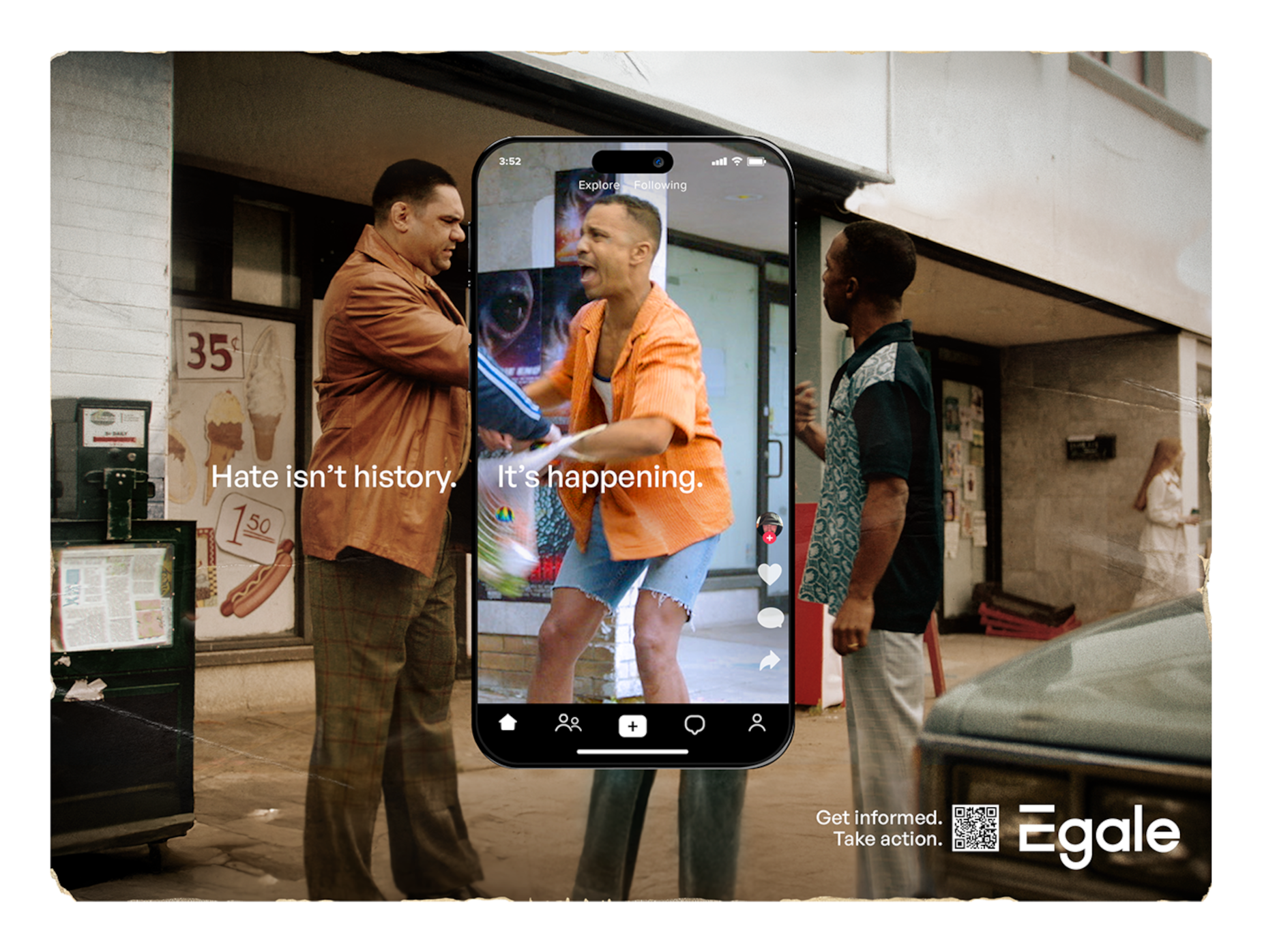
LBB> What was the writing process like? How did you capture discrimination in a way that would resonate with viewers, while also being sensitive towards members of the queer community who might have lived experience with similar circumstances?
Allen> We drew inspiration from real stories and things that are being said today, in the world and online. From there, the spots were written to mimic what some queer people experience in real life: a sudden moment of hate when you’re just trying to live your authentic life.
Our goal was to be sensitive towards people who have personally experienced hate, while also making the issue impossible to ignore. So, we were careful not to include specific details or locations from modern day acts of hate.
LBB> The actors who bring it to life – despite their limited screentime – are excellent. What was casting like, and how did you ensure meaningful queer representation?
Allen> The casting process was challenging, both because it was emotional to watch, but also because it was essential we found the right people. We were committed to ensuring equal representation from the 2SLGBTQ+ community, and the queer individuals featured in our spots reflected a range of identities and experiences within the community.
LBB> You also worked with an array of directors at Scouts Honour – one for each spot. What made them the right choices, and in an industry where typically projects are single director-led, what inspired you to choose three?
Allen> Scouts Honour understood the importance of this campaign and strongly believed in the creative.
Because of the complexity of the campaign – which involved shooting the same scenes across different decades for both video and print – there was a lot to coordinate. That’s why, to manage it all, Scouts Honour brought in a directorial trio.
LBB> With that in mind, what was filming like? Do you have any anecdotes from on set?
Allen> On set, both the directors and the creative team worked hard to ensure the past and present scenes had moments that could seamlessly overlap.
And, just like casting, it was an emotional day, as several people in the films had personally experienced similar acts of hate. We checked in regularly to ensure a supportive environment for everyone involved.
LBB> Aside from the films, this campaign is also designed to help inform people of things like how to stay safe at events, and how to be an ally. What sort of advice would you give people in both those respects?
Jennifer> We are in a moment in time where 2SLGBTQ+ people are facing an unprecedented amount of hate and discrimination. It’s important that we as 2SLGBTQ+ people look out for each other, especially the trans, non-binary and gender-diverse folks in our communities. They need our collective support now more than ever.
Being an ally can be as simple as fact checking. With the rise in AI and bots on social media, there is an unprecedented amount of mis, dis, and malinformation about our communities. Not taking something at face value and reading up further goes a long way. You can learn how to spot and combat these by visiting egale.ca/hateisnthistory.
Another often overlooked form of allyship is visibility. Whether it’s a progress Pride flag in a window to indicate your business is a safe space, or using a Pride screen on your smart watch, visibility can go a long way to helping 2SLGBTQ+ people feel safer.
Additionally, as you see in the campaign videos, speaking up and checking in are important ways to show your support.
LBB> VML and Egale also held a panel event that allowed 2SLGBTQ+ people to share their experiences with hate. How did it fit into the campaign, and how did it go?
Allen> The panel event was an important opportunity to hear a range of different perspectives from people of different generations. From ‘70s era activism, to the realities of hate on social media today, the panellists shared their own personal experiences with hate and reflected on what’s changed… and what hasn’t.
The discussion centred around how hate toward the 2SLGBTQ+ community has evolved across generations, while highlighting the ways it continues to persist. The panel featured voices from four distinct eras of advocacy and lived experience. Sue Wells, a member of the historic Brunswick Four, recounted the discrimination she faced in the ‘70s, and how it sparked early resistance. Lenore McAdam reflected on the hard-won progress of the '90s and early 2000s, including her role in one of Canada’s first legalised lesbian weddings. Tamara Lopez spoke to the courage and visibility of coming out in the public eye in 2020, while Myles Sexton, a non-binary influencer, shared the daily realities of digital-era hate and harassment.
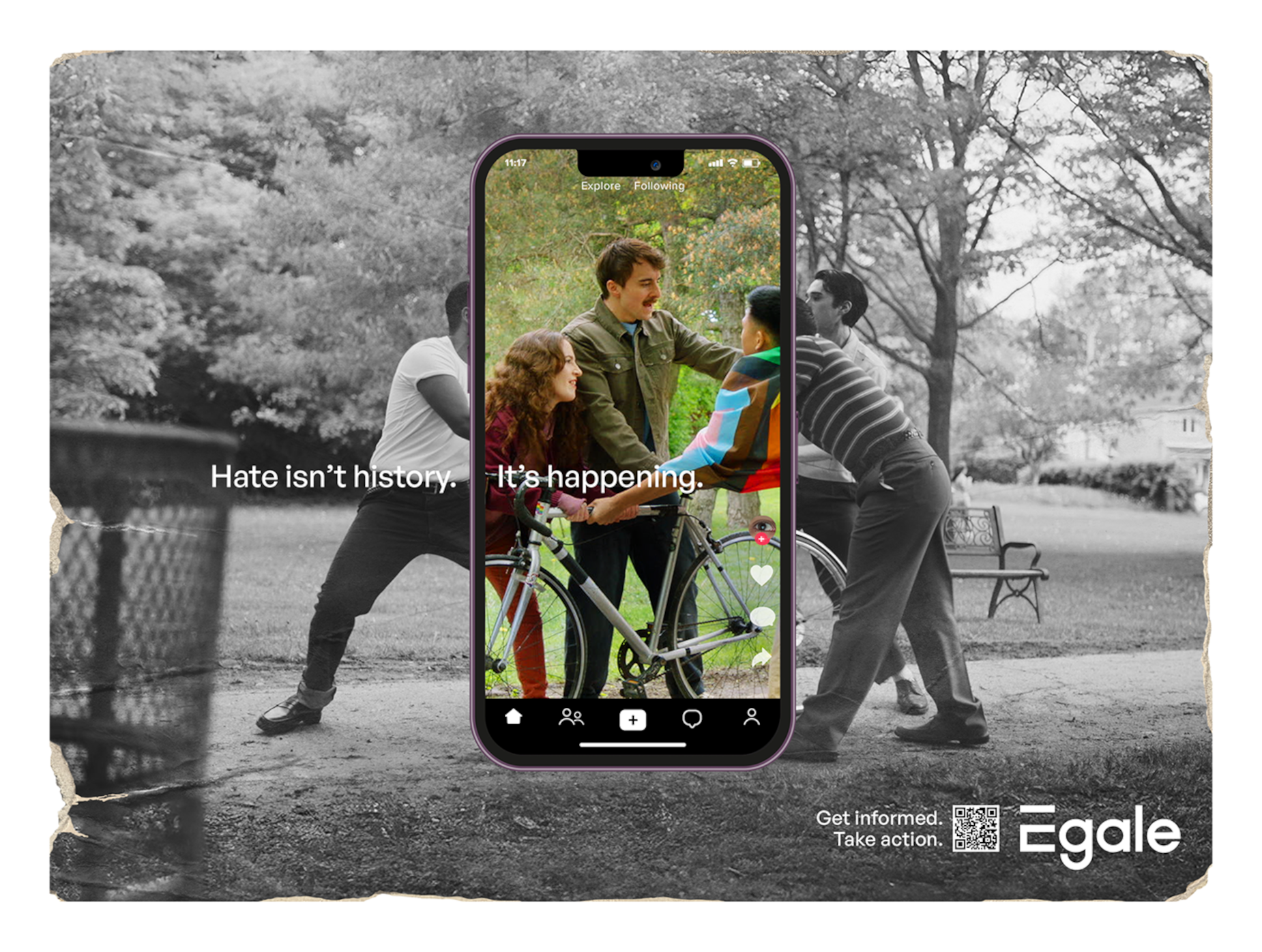
LBB> Since launch, how have people responded to this campaign, in all its aspects?
Allen> The response has been overwhelmingly positive. But, as a sign of the times we are now living in, it has also faced some online hate from anti-2SLGBTQ+ groups.
LBB> How does this campaign fit into Egale’s branding for 2025 and beyond?
Jennifer> Many people know Egale for our legal advocacy work. We have played a significant role in many of the legal cases that have contributed to 2SLGBTQ+ inclusion in Canada – one of the most notable being marriage equality. In fact, this year marks the 20th anniversary of marriage equality across Canada!
We’ve accomplished so much in the past two decades, but we also find ourselves faced with daunting new challenges, with the rise in hate, social media, and international influences in an ever-shrinking world. So, as we look ahead to our 40th anniversary next year, we know that our work isn’t done yet – because hate isn’t history; it’s happening. But, we are confident that together, and with the support of our allies, we can overcome anything.
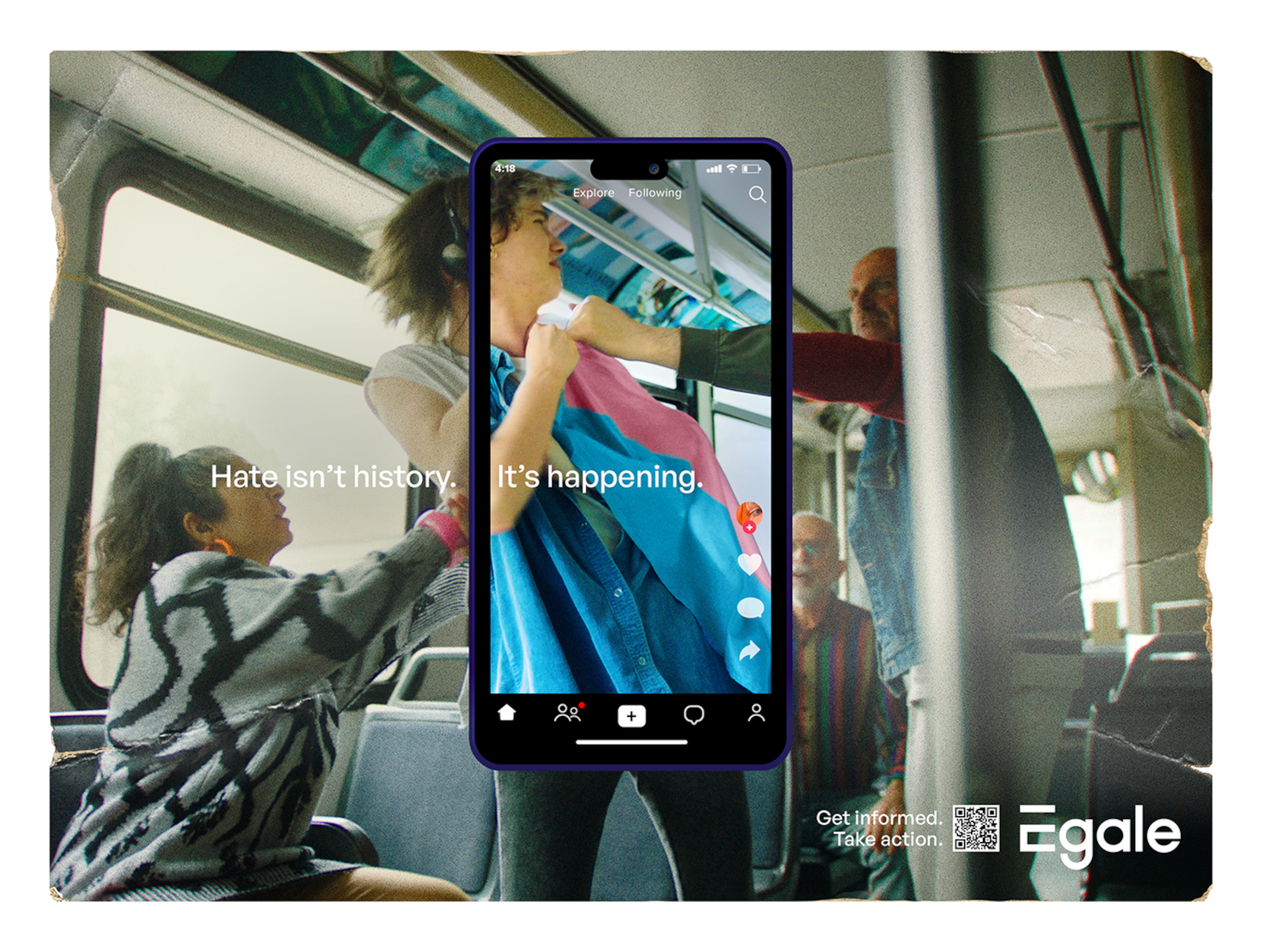
LBB> Finally, what does launching a campaign like this – at a time of much pushback against things like DEI and queer rights – mean to you?
Allen> As a member of the queer community, I feel that this campaign is vital. At a time when DEI efforts are being rescinded, many brands have pulled out of Pride, and queer rights are under attack, staying silent isn’t an option. Hate can’t go unchecked or else we risk going backwards.









